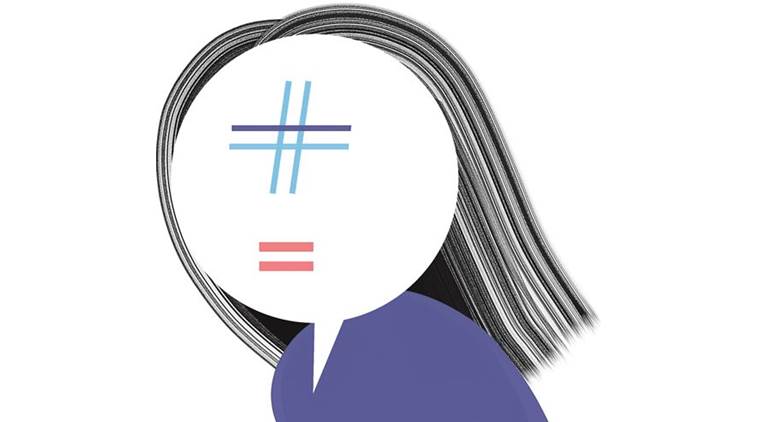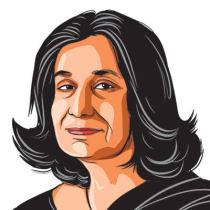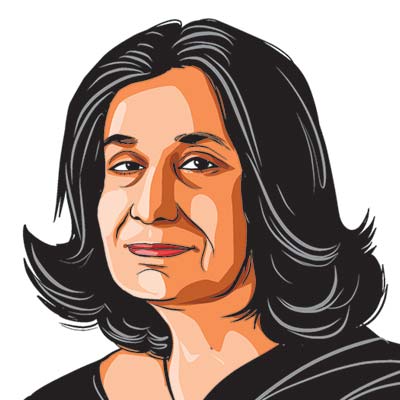From Akbar to Ayyappa
Reactions to both the #MeToo movement and the Sabarimala verdict signify profound contempt for — or fear of — the female body.

The ordinary male, on the other hand, believes he is entitled to claim any female body, of any age, at any and all times, for any and all purposes, but especially for sexual pleasure. (Illustration by CR Sasikumar)
Two apparently unrelated, recent developments have dominated newspaper headlines and social media, making for the kind of social and political churning that has far-reaching implications for both society and politics. I refer here to the Supreme Court ruling on the entry of women into the Ayyappa temple in Sabarimala, and to the accusations of sexual harassment by a number of women journalists against M J Akbar — former Union minister and powerful newspaper editor.
At the heart of the matter, as I see it, is the question of the body. In one, the celibate body of the lord counterpointed against the “impure” body of the menstruating woman. In the other, the sexually entitled body of the male (any male) over the sexually vulnerable and disempowered body of the female (any female).
Many Kerala temples disallow menstruating women from entering either the temple or the sanctum sanctorum, but the celibate lord at Sabarimala has to be protected from the distracting (and disruptive) presence of women at all times, if they are between 10-50 years old. (It is a matter of wonderment that the deity should find the body of a 10-year-old girl a distraction, but let us leave that aside for the moment.)
The ordinary male, on the other hand, believes he is entitled to claim any female body, of any age, at any and all times, for any and all purposes, but especially for sexual pleasure. Whereas the female body (between 10 and 50) threatens the celibacy of the lord, that very body, should it choose to withhold itself, voluntarily threatens the sexual entitlement of the ordinary male.
Underlying both conditions is a deep-rooted misogyny, casual on the part of one and customary on the part of the other. Yet both are two sides of the same patriarchal coin, and both betray such a profound contempt for — or fear of — the female body that they have to either punish it by casting it out, or control it by subjugating it.
By female body what we are talking about here, of course, is the sexual body, rather than the labouring body or the reproductive body (although those, too, can be punished and controlled) and it is precisely the anxiety about, and around, female sexuality that undergirds misogyny, casual as well as customary.
Misogyny is enabled, emboldened and entrenched via patriarchal privilege, which cuts across caste, class, ethnicity, religion, race and creed. That privilege remains secure and uncontested only for as long as it can control female sexuality — violently, if necessary, but usually via social, moral, legal or customary proscriptions. Should it spin out of patriarchal control, the entire edifice is at risk.
What #MeToo in M J Akbar et al’s case, and the Supreme Court verdict on Sabarimala have done is to unshackle the troublesome business of female sexuality from patriarchal control. #MeToo has called male sexual predators to account not simply by naming and shaming, but by refusing to succumb. By not ceding control over their bodies. By rejecting them and registering their revulsion. The Supreme Court verdict, similarly, has called out a discriminatory practice based on a sexual taboo — and one might add, an unspoken endorsement of untouchability — and simultaneously challenged male primacy in the matter of worship.
Both have struck a blow against patriarchal privilege based on sexual control. It is not surprising that the Sabarimala verdict has met with stiff resistance both by those who know when they have been bested, as well as by those who stand to benefit from the status quo. That women have come out in very large numbers against the free entry of women was only to be expected — after all, women are beneficiaries of patriarchal privilege, and who will give up that privilege voluntarily? Foregoing a few of your rights in exchange for substantial gains is a reasonable bargain. Moreover, without women’s complicity, the patriarchal project has no future.
So, too, those many worried men, and also concerned women, who fear that #MeToo will become a wild, unmanageable, untameable beast, trampling sharifs and innocents underfoot. Out of control. Who will be outed next? Am I going to be named and shamed? What about evidence? Due process? Do they count for nothing? All valid concerns, but underlying them is, I suspect, a disquieting realisation on the part of men that it is unbridled male sexuality — that signifier of power and intimidation — that is now being restrained, being disciplined, being told to behave. If it doesn’t, it will be exposed.
This sudden loss of power at the hands of women in one instance, and via a judgment on the other, has unsettled patriarchal privilege in unexpected — and unwelcome — ways. What makes it particularly galling is that it is female sexuality, hitherto under patriarchal control and supposedly for all time, that has upset the applecart. The fact that it cannot be used to justify discrimination, even in a place of worship. The fact that it cannot be abused at will and with impunity. The fact that women will no longer fall in line, remain silent.
Sexual politics has always been about control and power, but one half of that equation is now saying: Time’s Up. It will neither be cast out nor take things lying down.
The writer is with Women Unlimited, Delhi
For all the latest Opinion News, download Indian Express App
More From Ritu Menon
- A Shameful HonourThe protests against ‘Padmaavat’ draw on a deep misogyny..
- New India, hypermasculineImagined hurt, a readiness for violence and the abjuring of difference and diversity are its attributes..








































No hay comentarios:
Publicar un comentario